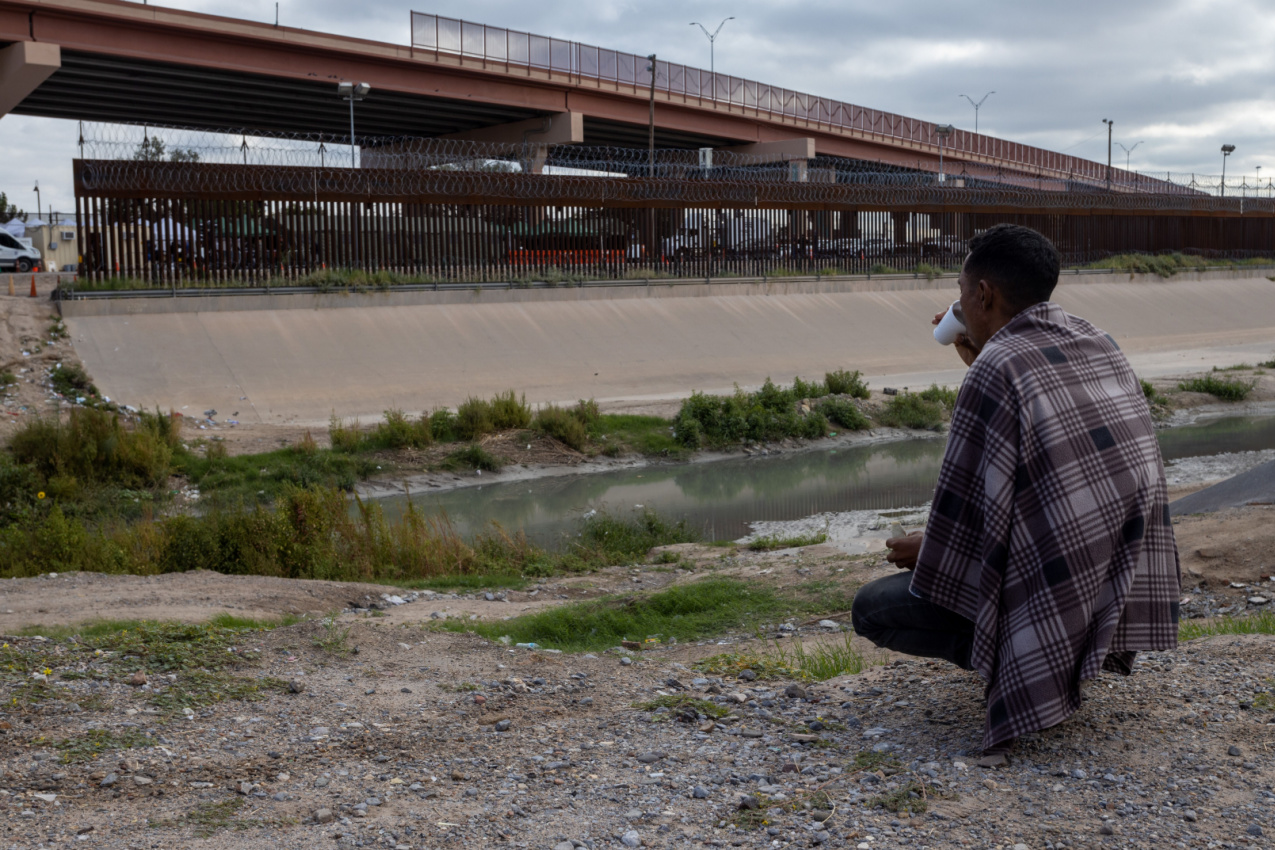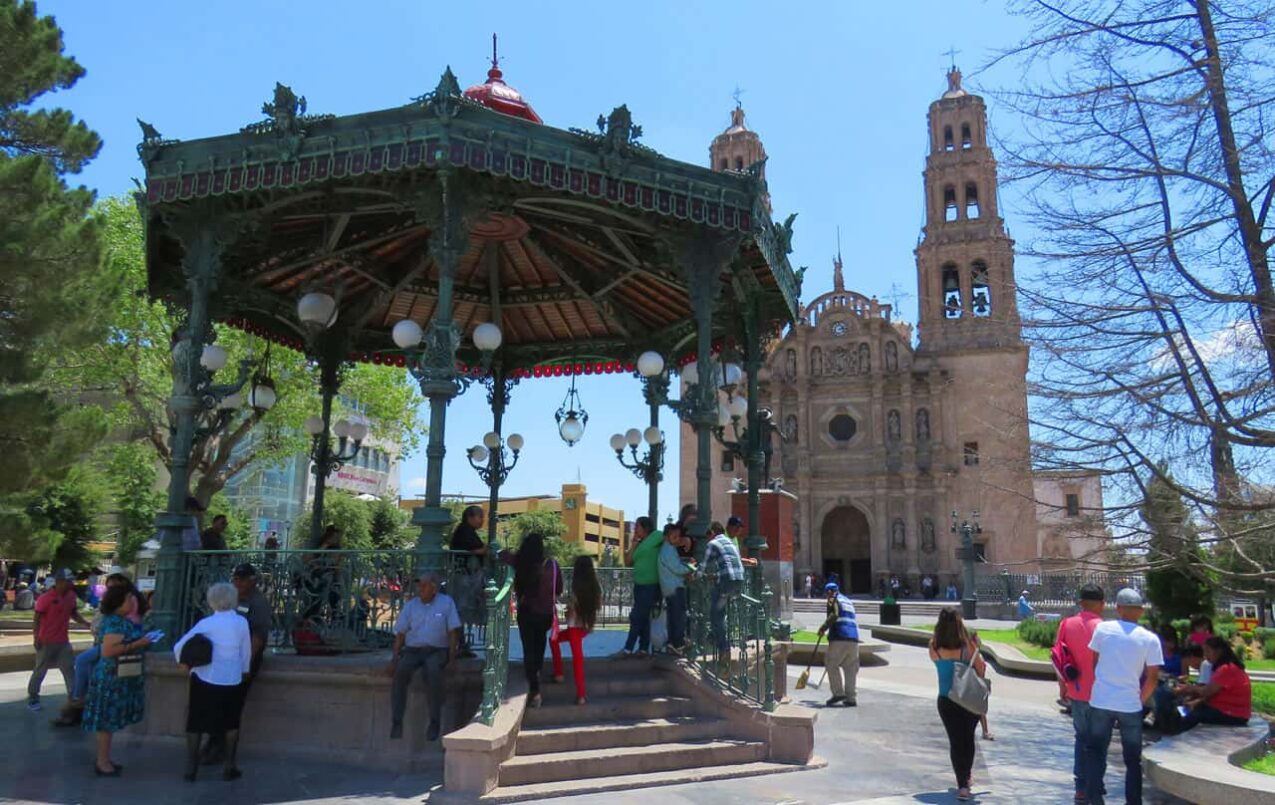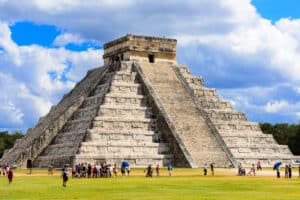Welcome to Chihuahua, the capital of Mexico’s largest state, of which the cute Chihuahua dog breed was centered. What a lovely fun fact to learn, right?
Yes, but curious travelers want to know something more important about this city, and that is: How safe is Chihuahua for travel? Unfortunately, you might not be happy with the response.
Despite its stunning scenery, extensive cultural legacy, and mouthwatering cuisine, the U.S. State Department has listed Chihuahua as a city to reconsider visiting.
Chihuahua is one of the most dangerous Mexican cities, so tourists are at their own risk if traveling there. If that tourist is you, and you must visit Chihuahua for whatever reason, we wrote the perfect guide to help you stay safe.
Let’s make the most of your Chihuahua trip while keeping safety as a top priority!
Are you planning a last minute trip to Chihuahua? We’ve put together all the resources you’ll need for a fun & safe travel:
🛌 Best & Safest Places to Stay in Chihuahua:
👉 Sheraton Chihuahua Soberano – City view, Garden, Outdoor swimming pool
👉 Central Hotel Boutique – Free WiFi, Facilities for disabled guests, Bar
👉 IHG Hotel – BBQ facilities, Heating, Private bathroom
👉 Casa Grande Chihuahua – Fitness centre, Bar, Tea/coffee maker in all room
🚗 Best & Safest Chihuahua Transportation Services:
👉 Airport Pickup Service – Welcome Pickups
👉 Rent a Car – DiscoverCars
🙏 Stay Safe While Travelling:
👉 Safetywing (for medical insurance)
👉 VisitorsCoverage (for trip insurance)
Unveiling the Reality: A Comprehensive Look at Chihuahua’s Crime Rates
Chihuahua City has a crime rating of 55.83, with criminal activity increasing in the last three years.
Because of that, the U.S. State Department issued a security alert for Chihuahua State, advising travelers to “Reconsider Traveling” to this area.
One of the primary reasons for this notice is the geo-position of the state — the capital is located along major drug trafficking routes, making it a significant hub for drug cartel activity.
The majority of criminal activity occurs in the non-tourist regions of Chihuahua. However, the U.S. State Department emphasizes that territorial disputes may occasionally arise in tourist zones.
What Are the Police Doing to Protect Chihuahua City?
The police force is in charge of upholding the city’s law and order, and they are the first line of contact when there’s danger.
Chihuahua is Mexico’s largest state, covering around 247,000 square kilometers (3.7 miles). Considering that some of the most critical trafficking routes pass through this state, it’s nearly impossible for the police to solve every criminal operation.
On a more positive side, and unrelated to gangs, Chihuahua City has a particular tourist police unit. These cops are stationed in tourist locations and are specially educated to assist foreigners. They speak English and provide helpful advice on navigating the city and staying safe.
Navigating the New Normal: Ensuring COVID-19 Safety in Chihuahua

The good news is that tourists don’t require a negative COVID-19 test to enter Chihuahua or any other place in Mexico.
However, the COVID-19 virus is still out there and spreading. So, as a preventative measure, authorities may have your temperature checked upon arrival.
If tourists suspect they have the virus, many Chihuahua hospitals, clinics, and laboratories provide private COVID-19 testing. PCR testing typically costs between 950 and 4500 MXN ($53 and $250), whereas viral antigen testing costs between 200 and 1000 MXN ($11 and $55).
The American Red Cross has compiled a list of procedures you can take to ensure a safe vacation to Chihuahua and avoid the spread of COVID-19. The most important are social distancing and frequent hand washing.
Perils of Nature: The Risk of Natural Disasters in Chihuahua
Two natural forces endanger the capital of Chihuahua: earthquakes and hurricanes.
Hurricane Information and Precautions
Hurricanes are large storms that bring strong winds and heavy rains, which can cause flooding and damage to homes and businesses.
Hurricanes form over warm oceans near the equator and are more common in the coastal or near-coastal regions of Mexico. Chihuahua City is inland, far from any coastlines where a hurricane can form. Nevertheless, the city can experience flash floods brought on by hurricanes, heavy rain, thunderstorms, and other extreme meteorological conditions.
Such a horrible storm happened in 1990 in Chihuahua City, fatally hurting at least 40 individuals and destroying more than 5,000 homes. The Red Cross also reported that 30 people were missing due to the flood.
Another big storm slammed the Chihuahua metropolis in July 2015, with more than two inches of rain falling in about 30 minutes and severe winds rocking the municipality. The authorities found one person drowned in the capital’s water canal, thousands of flooded and destroyed homes, and perished vehicles.
Chihuahua hasn’t recently had a natural disaster of this magnitude, but you can check the National Hurricane Service to monitor upcoming storms and reschedule your trip if needed. If you are already in Chihuahua during a storm, follow public safety officials’ advice, avoid driving or going outside, and pack only the necessities in case of evacuation. Follow the Massachusetts Emergency Management Agency for more safety tips regarding hurricanes.
Earthquake Information and Precautions
Earthquakes are generated by the movement of tectonic plates beneath the earth’s surface and can significantly harm people and damage the city’s buildings and infrastructure.
Mexico sits on the Ring of Fire, known for its seismic and volcanic activity. The most seismically active regions are along the Pacific coast and in the southern states of Mexico.
Since Chihuahua City is located in the northern part of Mexico and away from the Pacific Ring of Fire, it has fewer earthquakes, and they are of lower magnitude. However, they’re still present.
An earthquake last struck Chihuahua City on April 15, 2023. This earthquake measured 4.1 on the Richter scale. The most intense earthquake near Chihuahua City had a magnitude of 5.4 and was recorded on November 16, 2022.
You can track earthquake activity in or around Chihuahua State by visiting the Allquakes website. To inform yourself what to do in case of an earthquake, visit the U.S. Federal Emergency Management Agency website. You can also install the 911 CDMX app on your smartphone and receive an earthquake warning 60 seconds before it occurs.
Does Chihuahua City Suffer From Volcanic Eruptions?
There aren’t active volcanoes in Mexico’s state of Chihuahua. Chihuahua is in northern Mexico, known for its desert landscapes, canyons, and mountains. Volcanic activity is typically associated with places around tectonic plate boundaries, such as the Pacific Ring of Fire.
For the latest information about volcanic eruptions, go to the Mexican Disaster Prevention Centre’s website.
Breathing Safely in Chihuahua: Carbon Monoxide Awareness and Prevention
There have been no known incidents of carbon monoxide poisoning in Chihuahua.
Carbon monoxide is a dangerous gas that, if inhaled, can cause significant illness or even be fatal—as happened in Mexico City in November 2022.
Carbon monoxide can be produced by gas, wood, oil, or coal-burning fires and appliances that run on the same sources. The symptoms of carbon monoxide poisoning include headaches, dizziness, nausea, disorientation, weakness, chest discomfort, and loss of consciousness.
Whenever you plan a trip, choose a hotel with carbon monoxide detectors installed in the rooms. As a backup measure, purchase an extra detector and carry it on your travels.
Anyone exposed to carbon monoxide should get fresh air and seek medical attention immediately. Call 911 for police and 066 for ambulances directly if someone is in a carbon monoxide coma.
Chihuahua’s Weather Patterns: What to Expect?

Chihuahua enjoys two seasons: dry and wet.
The dry season in Chihuahua lasts from October to April. During this time, the city enjoys clear skies, little rain, and generally dry conditions. Temperatures throughout the dry season can fluctuate, with cooler temperatures in the winter (as low as 7°C/45°F) and warmer temperatures in the spring (as high as 25°C/77°F).
The wet season in Chihuahua City lasts from May through September. During this time, the capital enjoys warm weather, increased humidity, frequent rainfall, and thunderstorms. The months with the most rainfall are July and August. During the wet season, the average temperature ranges from roughly 17°C (63°F) to 29°C (84°F).
Even though Chihuahua City experiences rainy days throughout the wet season, the city experiences less precipitation than other parts of Mexico, like Tabasco or Chiapas. The annual rainfall in Chihuahua City is around 11.3 inches (288 mm). A day of rain is uncommon because most showers usually last a few hours and happen in the afternoon.
Weather Overview in Chihuahua City
Summer
The summer season in Chihuahua lasts from June to August. The hottest month is June, which characterizes the region’s torrid summers. The highest temperature during the day is 80°F (35°C), with the daily average hovering around 78°F (26°C). The temperature drops to 64°F (18°C) during the night.
Fall
Chihuahua’s fall season begins in September and wraps up in November. During this time, Chihuahua transitions from rainy to dry season, so rainfall continues but steadily minimizes. The average daily temperature may reach up to 71°F (22°C), and the maximum it can reach is 85°F (29°C). The nights are colder, with a minimum temperature of 42°F (5°C).
Winter
Chihuahua’s winter season begins in December and concludes in February. Winter is dry and chilly, with snow at higher altitudes around the city. During the day, average temperatures may reach up to 60°F (15°C), with the maximum coming to 75°F (23°C). Winter nights in Chihuahua are freezing and may drop to 35°F (1°C).
Spring
Chihuahua’s spring season lasts from March until May. Temperatures progressively rise in the spring, and the weather becomes pleasant and dry with occasional showers. The average daily temperature may reach up to 74°F (23°C) and the maximum to 91°F (32°C). Nights are chilly, with temperatures dropping to 45°F (7°C).
When Is the Best Time to Visit Chihuahua?
Chihuahua is most enjoyable to explore in the spring and autumn — especially if you like to avoid the winter cold and the summer heat.
However, Chihuahua’s weather is so varied that it can satisfy everyone’s travel preferences.
If you like hot weather, June is the hottest month in Chihuahua. If you want cooler weather, book your trip around December and January.
July and August are the rainiest times of the year. On the other hand, February and March are the driest months. However, as previously stated, rain does not fall continuously, and there will be plenty of sunny days in Chihuahua City during the wet season.
If you wish to escape the prime tourism season in Chihuahua, plan a trip in the fall or winter when the temperature is too chilly for most. Traveling during the off-season may be the best option if you want to save money.
However, if you are a people person and want to experience this city in its ideal season, the months of May, June, August, and January have a lot of visitors. Spring is also an excellent time to visit because it is neither too busy nor too quiet.
Exploring Chihuahua Solo or With a Family: Is It a Good Idea?

Since the U.S. State Department’s travel notice urges travelers to reconsider visiting Chihuahua, we don’t recommend traveling there solo or with a family.
So, until further notice, it’s best to avoid visiting this place and find a better and safer alternative, like Cancun.
However, if you must visit Chihuahua at all costs and wish to ignore the travel warnings, here are some tips and tricks to keep you safe.
Essential tips for staying safe:
- Learning some basic Spanish is the key to blending in
- Don’t wave at random taxis on the street, as they might try to scam you
- “Uber” and “DiDi” are two great taxi options
- Purchase a Mexican SIM card
- Be familiar with the emergency numbers, 911 for police, 066 for ambulances, and 080 for fire services
- Always book your stay in reputable hotels, hostels, apartments, or guesthouses (check the ratings and comment section)
- Don’t drink tap water
Tips for traveling alone:
- If you are a female, be mindful of how you dress to avoid getting unwanted attention
- Don’t wear shiny jewelry and too much money when you go out
- Never walk alone at night
- Keep an eye on your drink to avoid someone putting a narcotic in it
- Drink responsibly so you can stay wary of your surroundings
- Don’t give your contact number or the address of the hotel you’re staying at to a random person you’ve just met
- Don’t draw money from a public ATM, instead, go to a bank or a supermarket
- Ignore catcallers, especially if you are a solo female traveler
- If someone offers you illegal substances, kindly refuse them
- Inform someone close to you, such as a friend or family member back home, of your travel plans and what you want to do throughout the day
Tips for traveling with your family:
- Travel everywhere as a group, and never separate
- Pack a first-aid kit
- Watch for your kids at all times
- Since you’ll be a group of several people, it’s safer, more reliable, and more cost-efficient to rent a car rather than constantly taking taxis or buses
- Don’t stay very late at bars or restaurants for the sake of your children’s safety
- Drink responsibly, especially if you are driving
Conclusion
Our adventure to Chihuahua is now concluded. We hope you learned how truly unsafe this destination is and that you will seriously consider our advice and the warning from the US State Department and rethink visiting this location.
A vacation isn’t always worth the danger, and in areas like Chihuahua, you’ll never be able to rest and be truly free — instead, you’ll be on the alert for a possible scam or, worse, a cartel-related conflict.
But, if you must go, prioritize safety. You can experience the city’s wonders while remaining attentive and following our safety tips and tricks. Best wishes!



